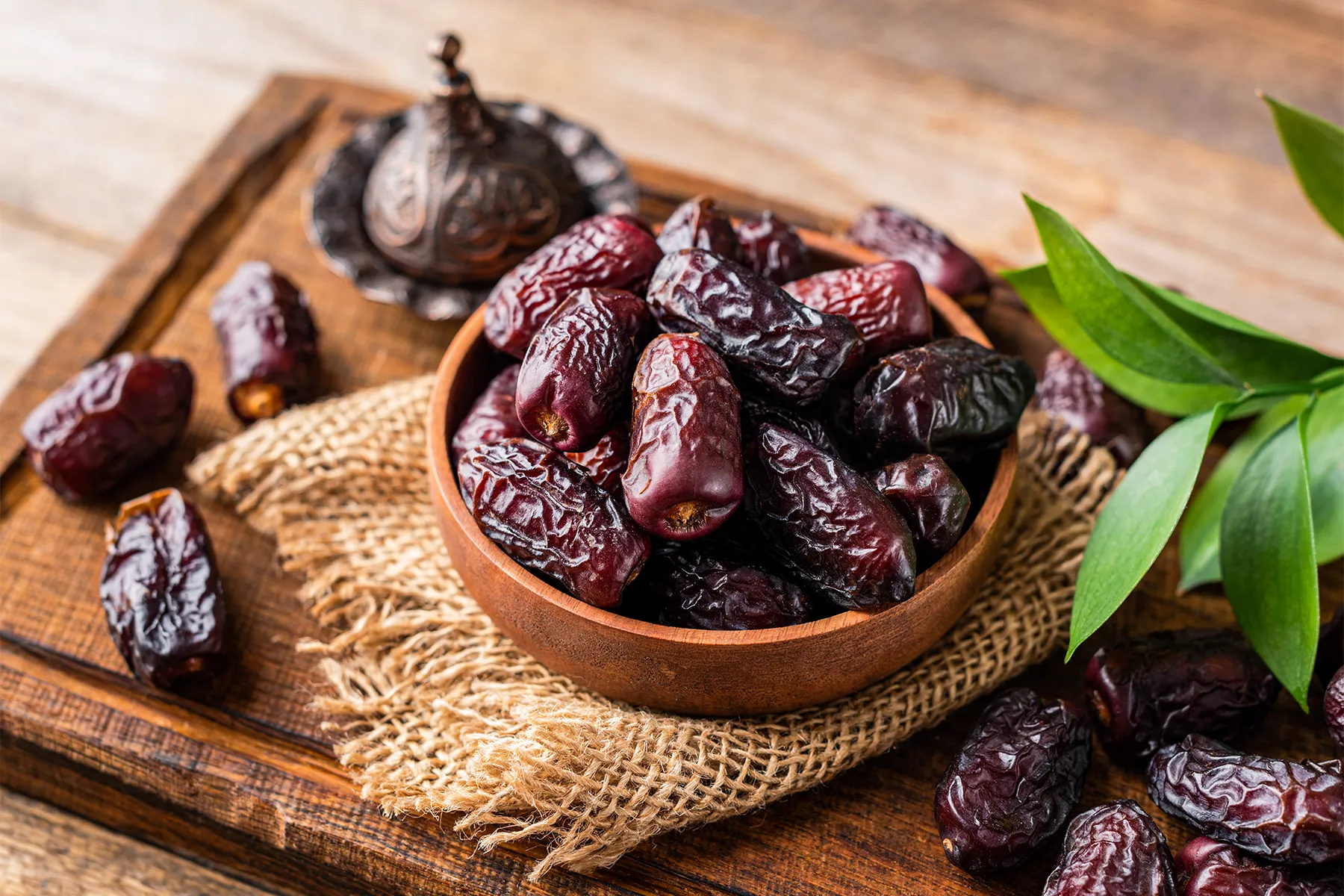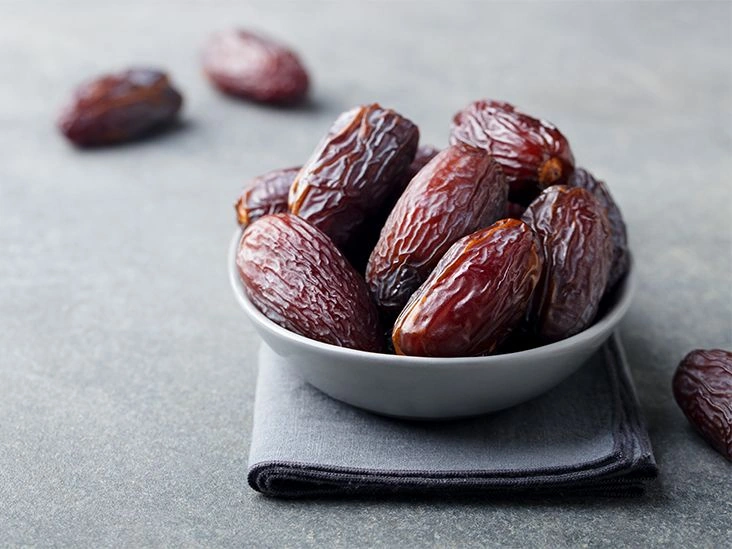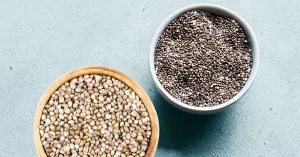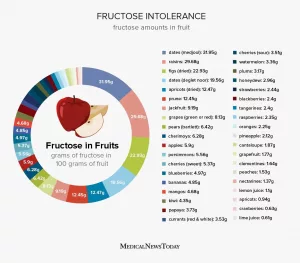You can enjoy Medjool dates fresh, dried, or used as a natural sweetener in recipes. They provide fiber along with other valuable nutrients, such as iron and potassium.

Medjool dates are a popular type of date prized for their rich sweetness. They tend to be bigger, darker, and have a more caramel-like flavor than other familiar varieties like Deglet Noor.
As tropical stone fruits, each date contains a single pit surrounded by edible flesh.
Originating from Morocco, Medjool dates grow on the date palm (Phoenix dactylifera) and are now cultivated in warm areas of the U.S., the Middle East, South Asia, and parts of Africa.
They are frequently sold in a dried-but-not-dehydrated state, keeping them soft and sticky. As they lose moisture, their sugars concentrate, intensifying their sweetness.
This article outlines the nutritional profile, potential health advantages, and ways to use Medjool dates.
Medjool date nutrition facts
Medjool dates are a dense source of nutritious compounds. A single serving supplies:
- Calories: 133
- Carbs: 36 grams
- Fiber: 3.2 grams
- Protein: 0.8 grams
- Sugar: 32 grams
- Fat: 0 grams
- Calcium: 2% of the DV
- Iron: 2% of the DV
- Potassium: 7% of the DV
- Copper: 19% of the DV
- Vitamin B6: 7% of the DV
- Magnesium: 6% of the DV
Dates deliver a noteworthy amount of fiber plus several vitamins and minerals, including iron, potassium, B vitamins, copper, and magnesium.
Medjool dates contain considerably more calcium than some other common varieties.
Calorie and sugar content
Dates are concentrated sources of naturally occurring sugars.
Although people watching their blood glucose may need to limit date consumption, a 2016 clinical trial reported this fruit has a glycemic index (GI) of 55.3, which falls into the low range.
A recent study also observed that consuming dates did not adversely affect blood sugar control in individuals with type 2 diabetes.
Still, Medjool dates are calorie-dense in small portions, so moderation may be wise.
Dried fruits like raisins, dried apricots, and prunes have more calories per serving than their fresh versions because they contain less water.
The majority of calories in Medjool dates come from their sugar content.
Potential health benefits
Medjool dates provide several potential health perks.
May support heart health
The fiber and antioxidant content of Medjool dates could contribute to cardiovascular protection.
Fiber can help reduce LDL (bad) cholesterol and maintain cleaner arteries, lowering heart disease risk. Two dates (48 grams) provide a notable amount of fiber.
One study found that Medjool and other date varieties promoted cholesterol removal from blood cells and prevented LDL oxidation, a process that can contribute to plaque buildup in arteries. Such plaque can eventually block circulation, increasing the chance of heart attack or stroke.
More research is necessary to confirm these effects. Recent reviews and meta-analyses of human trials have produced mixed findings.
A 2024 analysis suggested dates might reduce total cholesterol and triglycerides and raise HDL (good) cholesterol, but it showed no consistent decrease in LDL. Another 2025 study reported a reduction in total cholesterol but no effects on LDL, HDL, or triglycerides.
Medjool dates are also rich in antioxidants, which combat damage from unstable molecules called free radicals. Their carotenoid and phenolic acid antioxidants have been investigated for heart-related benefits.
Supports healthy digestion
Fiber is vital for good digestion and regular bowel movements. Adequate fiber intake helps form stool and prevent constipation.
Getting enough fiber may also lower the risk of digestive conditions like colorectal cancer.
In a study, 21 participants consumed 7 dates (50 grams) daily and experienced a significant improvement in bowel movement frequency compared with periods when they did not eat dates.
High in antioxidants
Medjool dates contain various antioxidants that can shield cells from oxidative harm linked to illnesses such as cancer, heart disease, and neurodegenerative disorders.
The antioxidant profile of Medjool dates includes flavonoids, carotenoids, and phenolic acids, which have been studied for their anti-inflammatory, anticancer, and other protective properties.
A review comparing dried fruits found that dates had the highest antioxidant levels relative to figs and prunes.
Other potential health benefits
- Natural energy source. Medjool dates provide a large amount of carbohydrates in a small serving. Carbohydrates are the body’s preferred energy source.
- May support bone health. Medjool dates supply modest calcium and are a good source of potassium, manganese, and copper—nutrients important for bone maintenance.
- May benefit brain health.Animal research links the antioxidants in dates to lower inflammatory markers and reduced brain plaque associated with conditions like Alzheimer’s disease.
Keep in mind that additional research is required to fully substantiate these claims.
How to add Medjool dates to your diet
Medjool dates are available year-round at most supermarkets and are commonly sold alongside other dried or raw foods.
Some packages contain pitted dates, but if you buy ones with pits, remove them before eating. Simply slice each date lengthwise and pull out the stone.
These fruits make an excellent substitute for refined sugar because their sweetness comes from natural fructose.
To replace sugar with Medjool dates, create a date paste by blending 2 cups (480 grams) of pitted dates with 1 1/4 cups (300 ml) water. Use the paste in recipes in a 1:1 exchange for sugar.
You can also add dates to smoothies, sauces, and dressings, or finely chop them in a food processor for no-bake treats like crusts, energy bites, and fruit-and-chocolate bars.
Additionally, raw Medjool dates can be stuffed with peanut butter, cheese, nuts, or even cooked grains like rice.
Store dates in a cool, dry spot such as a pantry or the refrigerator. Keep them sealed to preserve moisture.
The bottom line
Medjool dates are calorie-rich but packed with nutrients and antioxidants associated with several health benefits.
Notably, their fiber content may aid digestion and support heart health while helping lower the risk of chronic diseases.
They can be eaten as a snack, blended into smoothies, or used as a natural sweetener in many recipes and desserts. For related reading on using dates as a natural sweetener and their broader benefits, see our benefits of dates and a guide to medjool dates.

























Leave a Reply
You must be logged in to post a comment.